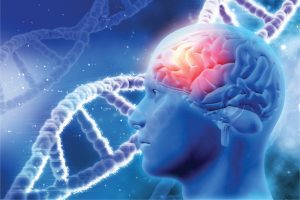By Debra Florio
 Do you know the difference between Dementia and Alzheimer’s? Are you concerned about your own cognitive health?
Do you know the difference between Dementia and Alzheimer’s? Are you concerned about your own cognitive health?
Alzheimer’s disease accounts for up to 80% of all dementia cases.
Alzheimer’s is NOT a normal aging process. Alzheimer’s is a neurodegenerative brain disease, other neurodegenerative diseases, such as ALS, Diabetic Peripheral Neuropathy, MS, Parkinson’s Disease and Stroke. Alzheimer’s causes a slow decline and destruction of memory, thinking and reasoning skills, along with changes in personality and behavior. Early-onset can afflict many under the age of 65. It is a progressive disease and there is no cure. Treatments are available to assist with cognitive thinking and improve the quality of life. At the early stages, it affects mild memory loss. It progressively gets worse, and the person will not be able to hold a conversation or function on their own. Treatments are available to slow the progression, NOT stop the progression.
Typical aging memory loss is when you temporarily forget a name or phone number; however, it comes to you eventually. Alzheimer’s, early stages, you cannot recall new information. The person afflicted with Alzheimer’s may ask the same question over and over or forget appointments or a loved one’s birthday, or even their own. It takes them longer to concentrate on a task. The person with Alzheimer’s may forget how to function and keep up with personal hygiene and cleanliness at home, or make poor decisions, such as money decisions. As the disease progresses, the person’s personality may change; they may feel frustrated, confused, fearful, angry, mean, paranoid. Further progression affects eating, and even walking.
“Dementia is a general term for a decline in mental ability severe enough to interfere with daily life. Alzheimer’s is the most common cause of dementia. Alzheimer’s is a specific disease. Dementia is not.”
Dementia is not a specific disease as Alzheimer’s is. Signs of dementia:
• A decline in memory
• Changes in thinking skills
• Poor judgment and reasoning skills
• Decreased focus and attention
• Changes in language and communication skills
Alzheimer’s disease, however, is the most well-known and common form of dementia, but not everyone with dementia has Alzheimer’s disease.
• Dementia
• Depression
• Paranoia
• Frustration
• Aggressiveness
• Declined personal hygiene
• Delusions
• Poor Judgement
• Difficulty in daily tasks
• Weight Loss
• Unable to communicate
• Seizures
• Loss of bodily functions
• Increased sleep
Science has suggested that Alzheimer’s contributing factors are genetics, environment, and lifestyle that affect the brain over time.
Researchers trying to understand the cause of Alzheimer’s disease are focused on the role of two proteins: One protein, Plagues, start to cluster together and disrupt the communication of the cells. The other protein, Tau, affects the neurons transport system to carrier nutrients. They change their structure into neurofibrillary tangles, which include other toxins and debris. These tangles also disrupt the transport system and are deadly to cells. So, your brain is not getting the proper nutrients and communication.
According to the NIH (National Institute of Health), damage to the brain starts a decade before memory and other cognitive difficulties become symptomatic.
Proven natural treatments:
• NAD, (nicotinamide adenine dinucleotide)
• Glutathione
• PEMF (pulsed electromagnetic field therapy)
• Diet & Exercise (lower BMI) lower toxic Plagues
• Brain activity, memory games, crossword puzzles
• Rejuvenating Sleep and more…
Our mission at Optimal Health and Wellness is to educate, coach and provide natural treatments for your cell health.
ALL HEALTH IS CELL HEALTH!
One way to charge and energize your cells to enable your body to fight illness and disease is PEMF therapy (pulsed electro-magnetic therapy), which charges all 75 trillion cells in your body with each session. Your cells need to be charged just like your cell phone. When your phone is fully charged, it works great; when it is not fully charged, all your apps work slowly and sometimes not at all. Our cells need help staying charged, since there are so many environmental variables that negatively affect our Mitochondria cell health.
While receiving your PEMF therapy, you could also receive a NAD and Glutathione infused IV. Intravenous therapy offers the best transportation of nutrients into a cell membrane that has been primed with the PEMF for the greatest absorption. NAD is essential to living and is found in every cell of all living things. NAD declines as we age. Declining NAD is due to the inability of our cells to recycle NAD, or to synthesize new NAD. This decline is associated with Alzheimer’s Disease. Alzheimer’s is associated with dysfunctional mitochondria in brain cells. NAD directly affects the dysfunctional mitochondria of the cell into an extremely healthy, strong powerhouse.
Optimal Health and Wellness
Debra A. Florio, LMT, CPT
239-851-7422
Affiliate of UFirst Health and Rejuvenation
Dr. Anne Lord-Tomas, Director
12650 World Plaza Lane, Bldg. 72-2
Fort Myers, FL 33907
Lic# MM37290 / NHA F2G7C7F9 / MA38601
Reference:
Nicotinamide riboside restores cognition through an upregulation of proliferator-activated receptor-γ coactivator 1α regulated β-secretase 1 degradation and mitochondrial gene expression in Alzheimer’s mouse models – PubMed (nih.gov)
Dementia vs. Alzheimer’s Disease: What Is the Difference? | alz.org
Alzheimer’s disease – Symptoms and causes – Mayo Clinic
https://www.alzheimers.net/7-22-15-lifestyle-changes-help-reduce-risk-of-dementia










